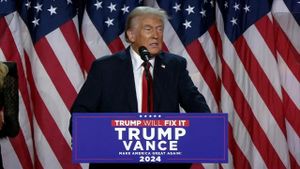The rivalry between the United States and China, particularly in the tech arena, has escalated significantly since Donald Trump's first term as president. Now, with his return to the presidency anticipated, experts are predicting even stricter measures will be put in place to curb China’s technological advances.
During his previous administration, Trump initiated aggressive tactics aimed at limiting China’s access to American technology. This included tariffs, trade barriers, and strict export controls, aimed at halting what many viewed as unfair competition and espionage. His hardline approach has set the stage for what some analysts are describing as the "new tech Cold War."
With his return to power, the expectation is he will build upon these initiatives. Former officials suggest the incoming administration will likely take more severe action against China, leaning even more heavily on tariffs as tools for economic warfare. They foresee Republican officials taking less of the cautious approach characteristic of the Biden administration, aiming for swift implementation of new tech regulations.
At the heart of these concerns are specific sectors, particularly semiconductors and artificial intelligence, seen as pivotal for both national security and economic competitiveness. The Trump administration’s policies created waves, targeting technology transfer to China which many believed equipped the rising power with sophisticated capabilities. This tech competition is not merely about commerce; it signifies broader geopolitical tensions.
The anticipation for Trump's next term could also parallel recent international developments, including China's increasing focus on self-reliance for tech. After facing challenges under previous sanctions, China has made deliberate strides to develop its own semiconductor manufacturing capabilities. Analysts worry this could lead to even more aggressive posturing from the U.S. side.
Meanwhile, the tech industry itself has begun to express concerns about the potential fallout from such escalated actions. Lobbying groups like BSA | The Software Alliance are urging Trump to find the right balance between ensuring national security and fostering innovation. They have voiced skepticism on overly stringent policies, arguing they could stifle the American tech industry’s ability to compete globally.
The BSA advocates for continued international collaborations and has called on the Trump administration to promote open data environments for developing AI governance standards, rather than retracting initiatives put forth by Biden’s administration. This echoes sentiments from many within the tech sector who recognize the necessity of drawing clear lines between security measures and operational efficiency. Execution of regulations should ideally lessen friction rather than stifle growth.
Beyond the tech sector, Trump’s broader economic strategy will continue to shape the U.S.-China relationship, particularly with the mid-term elections recently solidifying Republican control. The political climate suggests there will be considerable pressure to react decisively against perceived threats from China.
Trump's administration reflects bipartisan support for limiting economic engagement with China, pushing for more stringent rules on U.S. investments tied to Chinese technology interests. The reemergence of this stance marks a notable shift paralleling growing concerns over Chinese influence within global supply chains.
Looking back, the Trump administration initiated several executive orders aimed at specifics like supply chain security featuring semiconductor assets. Foreign companies, particularly those with ties to China, are now under tighter scrutiny, fostering environments where U.S. investors might need to tread carefully.
The latest actions under the newly released Outbound Rules, aimed at curbing U.S. investments threatening national security, could have ripple effects across various sectors. Companies engaged with PRC-connected businesses will need to navigate complex compliance landscapes, aligning with new diligence requirements establishing tighter control over tech sector investments.
Overall, Trump's strategy is poised to deepen the existing tech Cold War, driving both nations toward heightened protective measures and reshaping the global tech ecosystem. The competing national strategies pose new questions not just about competition, but about innovation, collaboration, and global stability.
It’s clear this geopolitical clash is more than just about tech; it's shaping the balance of power and influence worldwide as both nations grapple with the challenges of an interconnected economy whilst safeguarding their respective interests.



